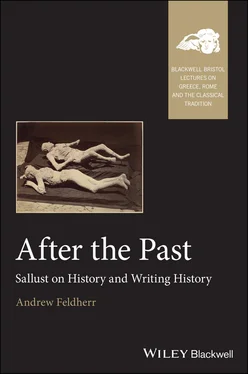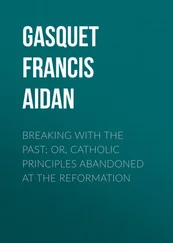I will also move beyond Grethlein’s interest in narrative form per se to ask how the choices with which these strategies confront the reader make sense in relation to the intellectual and political crises of the time when Sallust wrote. The perspectives constructed respectively by teleological and experiential understandings of events position the historian, his text, and his readers “after the past” in two contradictory senses. The assimilation of contemporary experience draws its audience closer to events and highlights also the continuities between actions and representations. The audience is “after the past” because they perceive how their present connects with that past, as for instance in perceiving the passions aroused by Catiline’s defeat as still driving civic discord. Audiences looking back at Sallust’s narratives as though completed can translate the analytic distance necessary to make judgments about the past into a separation from the political life of the state that forms history’s subject. To select another example from the Catiline , Sallust’s discussion of the crucial ethical term virtus goes together with the recognition that the two figures whose actions make virtus visible have passed from the scene ( Cat . 53.6).
Modern investigations of perspective in historical narratives generally concern the epistemological validity of the representation of the past they offer: this involves both such traditional questions as “Is this narrative impartial enough to be credible?” and more radical ones such as “What is the ontological status of an event like World War I before its representation?” 6And this emphasis also emerges in Sallust, especially since actors’ perspectives on events often take on a rhetorical form that shows them as anything but impartial. Indeed, a crucial methodological passage of the Catiline suggests that the very proliferation of self-interested claims about who did what to whom makes the past unknowable ( Cat . 4.2). But these issues about the credibility of different views of the past form part of a larger debate about the status of the historian and of historiography itself, which Sallust, as we shall see, positions ambiguously between action and leisure. Sallust presents writing history as a turning away from politics, but in almost the same breath presents it as a way of fulfilling the highest function of political action, indeed of all action, to provide scope for demonstrating excellence. These questions about historiography’s distance from and proximity to events are enacted in the narrative when the historian appears as alternatively participating in public achievements or as retrospectively translating these achievements into ethical universals. The central debate in professional scholarship on Sallust may be recognized as a version of the same question: Was Sallust a historian or a pamphleteer? Did he aim to explain and understand the past or to construct a version that would support his allies and defame his enemies? 7That this portrait of the political Sallust so resembles what he himself imagines hostile readers would say about him, namely that he attacks others’ faults out of malevolence, suggests the extent to which this debate itself arises from alternatives put forward in the text ( Cat . 3.2). Some critics have tried to move beyond the Sallustian “problem” by presenting the conceptions of “historian” and “pamphleteer” it opposes as fundamentally modern conceptions that create a false dichotomy (see below). History, especially in the Roman world, was both more connected to political persuasion and deployed the tools of rhetoric. But if the basic oppositions, if not the particular labels we apply to the alternatives it presents, do emerge from Sallust’s own representation of his work then we may come to understand Sallust better by continuing to ask such questions about the ultimate nature of his activity as a writer than by settling them.
If the use I make of Grethlein’s mode of analysis accentuates contrasts and inconsistencies within Sallust’s text, these characteristics dominate analyses of other formal aspects of Sallust’s work. Antithesis, inconcinnity, and unmediated junctures ( asyndeta ) have been since antiquity among the most immediately recognizable features of Sallust’s style. Kurt Latte’s remarkable 1934 study of the author not only gave a full account of these compositional principles, from the smallest patterns of word arrangement to the structuring of the entire monographs, but made them the basis for a comprehensive interpretation of the historian’s work. Rather than treating Sallust’s political aims as the explanation of his style, Latte worked backward in constructing an intellectual biography of the historian based around contradiction. The restless energy of Sallust’s style bespeaks the frustration of a man excluded from participation in public life for whom literary activity could never count as an acceptable substitute, another manifestation of the duality between writing and acting with which Sallust confronts his reader. From then on, the Sallust “problem” (politician or historian?) was replaced by efforts at synthesis. 8Syme’s declaration that Sallust must be read as both a historian and a participant in public life would be shared by the two other large-scale monographs that appeared in the generation after Latte’s, those of Büchner (1982) and La Penna (1968). For all their different understandings of Sallust’s political views, these books combine stylistic and historical analysis to a degree matched in the study of no other Roman historian. Antithesis comes to the fore again in the next great wave of Sallustian scholarship, beginning in the late 1980s. As Woodman and Wiseman’s redefinition of historiography brought it closer to rhetoric than reporting and so authorized a new range of literary approaches to works in the genre, 9Sallust’s mode of writing became important as something more than a symptom, as for Latte, or even an indispensable tool for recovering the complexities of his political thought. In the works of such scholars as Batstone, Kraus, Levene, Gunderson, and Sklenář, to mention but a few salient examples, the striking comparisons Sallust’s writing exposes without resolving, in different ways, draw attention to representation itself. It is the manifestation of a political climate where the capacity of representing things in words has been compromised and the sense of a clear referent, or even a coherent intellectual connection between opposing terms, is laid open to question. 10These are the scholars who taught me to read Sallust, and my own emphasis on the experience of his text as itself fundamentally politicized owes more to their influence than citations to specific arguments can suggest. 11
The issue of the author’s own distance from or proximity to public events also forms part of a larger transformation in the place and status of literary activity that becomes especially acute just in the years when Sallust turns from politics to history writing. The volatility and violence of the last decades of the Roman republic compelled many members of Rome’s ruling classes to withdraw from their careers, and often from the capital itself, temporarily or permanently. At the same time the opportunities to construct an alternative presence in the public eye through writing had never been greater. Rhetorical training, amid the trials and debates of these decades, was more obviously than ever a means of gaining influence and power, but this training also made it easier for those out of the spotlight to transfer the voice and persona they had forged in their oratory to the page. The elite networks by which money was made and provinces governed in the growing empire also provided a mechanism for the circulation of letters and treatises. Finally, the new cultural capital acquired through conquest and trade, in the form of books and highly literate slaves, at once opened up new forms of literary expression, contributed to the production and circulation of texts, and perhaps gave a new prestige to literary activity as a vehicle for displaying wealth and status.
Читать дальше












